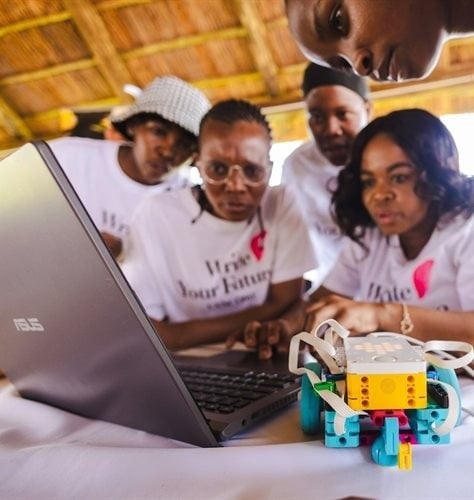
Young women were trained how to code in Limpopo last week, thanks to an initiative called Write Your Future by the Social Coding, a local non-profit company, and makeup giant.
The Social Coding uses digital literacy and technology tools such as coding, robotics, and virtual reality (VR) to expand socio economic inclusion among young people living in rural communities and to help them use these digital skills to break the cycle of poverty and build successful careers.
“We prioritise digital inclusion so that young people from rural areas can have a better chance of completing their schooling, furthering their education and gaining access to meaningful work,” explained its founder, Thembiso Magajana.
Magajana added and said that they are committed to ensuring that every young person, no matter what their background or circumstances, has the chance to learn, grow and thrive in the digital age.
The general manager of L’Oréal South Africa’s luxury products division Yumnaa Waja said that the aim of Write Your Future is to bridge some of the barriers that prohibit youth from becoming active, engaged, productive and independent citizens.
“While adult literacy in South Africa is fairly high, the digital gap is still a notable issue and is a significant barrier to entry into the digital economy. Write your Future is specifically designed to ensure that young women have the skills necessary to compete successfully in today’s world of work and to be both personally and financially independent.”
She further explained that upon completion, participants will be equipped with a higher certificate in information technology.
“They will then have the opportunity to participate in an eight-month internship. With Social Coding, we want to empower every woman to be the author of her own destiny.”
According to the 2022 JCSE-IITPSA ICT Skills Survey, South Africa still has a critical shortage of ICT skills, posing a significant threat to the country’s ability to benefit from the fourth industrial revolution.
The survey, which is conducted annually by Wits University’s Joburg Centre for Software Engineering and the Institute of Information Technology Professionals South Africa, found that the digital skills gap is still so substantial that organisations are struggling to fill tens of thousands of vacancies. Critically, this means that a large cohort of South Africa’s youth is
unable to take advantage of the opportunities presented by the digital economy.
The project was made possible by French makeup and skincare giant Lancôme, which is owned by L’Oréal.
Editor’s note: If we can continue on such projects which are centered on prioritizing digital inclusion, we can do more good when it comes to women empowerment and we would leave no one behind in a world that is digital.
Description: The Social Coding uses digital literacy and technology tools such as coding, robotics, and virtual reality (VR) to expand socio economic inclusion among young people living in rural communities and to help them use these digital skills to break the cycle of poverty and build successful careers.
Editor: Thato Mahlangu
Project manager: Do4SA
Do4SA NPC
Standard Bank
Branch: 024210
Acc. Number: 371 278 627
Swift Address: SBZA ZA JJ
Subscribe to The Altruist monthly newsletter which will help decision-makers gain a ground level understanding of the dynamics of poverty.